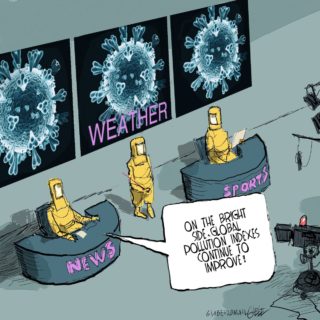Police in Hong Kong cracked down on protesters Sunday, arresting at least 180, in the wake of Beijing’s pledge to move quickly on a new law that will extend China’s concept of justice to those who challenge Communist Party leadership in the territory.
They were the first protests since Chinese authorities announced their plans to impose the new law, which will criminalize conduct according to Beijing’s definitions of what constitutes separatism, terrorism, subversion and illegal foreign meddling.
The draft decision on establishing and improving the legal system and enforcement mechanisms for Hong Kong on national security also gives mainland China the right to place its own enforcers on Hong Kong soil. The law is expected to be finalized this week by the National People’s Congress, China’s rubber-stamp parliament, and enacted soon after.
It “has become a pressing priority. We must get it done without the slightest delay,” China’s foreign minister Wang Yi said.
For nearly a year, the Asian financial centre has been a city of both peaceful demonstration and violent protest. With the law looming on the horizon, protests erupted as the city streets were drenched in tear gas and blocked by makeshift barricades.
On Sunday, police descended swiftly on protesters with a show of force that bloodied the streets. At least four officers were injured in clashes, according to a spokesperson for the Hong Kong government, who issued a lengthy statement late Sunday calling the protesters’ conduct an “outrageous” and ”serious threat to public safety.”
Those who waved “Hong Kong Independence” flags on Sunday undermined “the overall and long-term interests of Hong Kong society,” the spokesperson said, adding: “rioters remain rampant, reinforcing the need and urgency of the legislation on national security.”
But in a city where most people self-identify as “Hongkonger” rather than Chinese, the space to oppose the move is already diminishing.
Local police have refused to authorize peaceful protest, making street assemblies illegal. Epidemic health rules bar gatherings of more than eight people. And Beijing’s enthusiastic backing has further empowered Hong Kong’s police, already accused by human-rights groups of brutality in their handling of violent protests, to clear the streets.
”Protesters now face graver potential danger and legal consequences,” said Bonnie Leung, a pro-democracy campaigner in the city.
“Given the severity and urgency of the national-security law, people will certainly want to return to the street,” said Avery Ng, a pro-democracy activist who is among a group of 15 recently arrested people that Chinese state media call “riot leaders.” But, he said, “I worry that many people cannot return to the street to protest without risking their personal safety.”
A schedule of coming protests suggested some remain willing to risk the consequences of flouting orders to stay home. Weekly demonstrations are planned until July, including calls to “besiege” the city’s legislative council and hold rallies to “reignite” the fury that brought millions onto the streets last year in opposition to a controversial extradition treaty proposal that has now been cancelled.
But Chinese state media already began to name some of the Hong Kong figures they expect to be silenced when Beijing imposes the new national-security rules.
On Sunday, the Communist Party-backed Global Times called Hong Kong publishing tycoon Jimmy Lai a “traitor.” The paper cited Chinese experts who believe Mr. Lai, an outspoken democracy advocate, “cannot escape from the punishment of the national-security law.”
On Sunday, Mr. Lai answered on Twitter: “Even before enacting the #nationalsecuritylaw the state propaganda machine denounce me for an offence that does not exist. It reveals the ugly truth that the law intends to frighten, silence and suppress people who question the dictator.”
Hong Kong democracy advocate Joshua Wong, who was also named by the Global Times, offered his own response on Twitter: “the new law will kill future democratic movements, and murder any slight chance to seeking justice in the city.”
He warned that Hong Kong’s large expatriate community also has reason for fear. He held up as an example what he called Chinese “hostage diplomacy” in its detention of Canadians Michael Kovrig and Michael Spavor after the arrest in Vancouver of Huawei executive Meng Wanzhou.
Canada, Australia and Britain on Friday issued a joint statement saying they are “deeply concerned” about the national-security law. “Making such a law on Hong Kong’s behalf without the direct participation of its people, legislature or judiciary would clearly undermine the ‘one country, two systems’ principle under which Hong Kong is guaranteed a high degree of autonomy,” the statement said.
More than 200 international parliamentarians have also signed a statement that decries a “comprehensive assault on the city’s autonomy, rule of law and fundamental freedoms” and calls for sympathetic governments to “unite to say that this flagrant breach of the Sino-British Joint Declaration cannot be tolerated.”
Among the signatories are Conservative Party leadership candidates Peter MacKay and Erin O’Toole, as well as prominent Liberal figures, including Senator Jim Munson and former interim party leader Bob Rae.
Beijing dismissed such concerns.
“Instead of becoming unnecessarily worried, people should have more confidence in Hong Kong’s future,” Mr. Wang, the foreign minister, said Sunday. Violence and “terrorist activities” in the city have “posed a grave threat to Hong Kong’s prosperity and stability,” he said.
The security law drafted by Beijing, he said, “will improve Hong Kong’s legal system and bring more stability, stronger rule of law and a better business environment to Hong Kong.”
“Every country has a right, and indeed a duty, to protect national security and sovereignty. To suggest that our sovereign, China, does not have the right to legislate to protect national security in the Hong Kong Special Administrative Region (HKSAR) smacks of double standards and hypocrisy,” said a Hong Kong government spokesman in a statement, in response to criticism of the new law by foreign politicians.
NATHAN VANDERKLIPPE
ASIA CORRESPONDENT
The Globe and Mail, May 24, 2020

